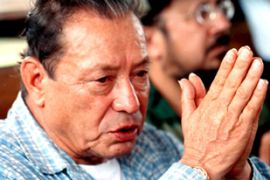Farc chief dead, says Colombia
Government officially announces the death of group’s founder and supreme leader.

| In depth |
|
|
“If Marulanda has died, however he died, it would be an incredible victory for Colombia’s government.”
Santos also said Marulanda may have been replaced as Farc leader by Alfonso Cano.
The Colombian army said Cano has been cornered in the southwestern jungle for months, and that his death or capture is imminent.
But Farc statements have denied that Cano is in that area.
Peasant background
Born to a peasant family, Marulanda, whose real name is Pedro Antonio Marin, is believed to have been radicalised by the civil wars that raged in Colombia in the middle of the twentieth century.
He and other survivors of a 1964 army attack on a peasant community escaped to the mountains and formed Farc, which grew over the decades to include a reputed 15,000 fighters.
Marulanda’s deadly aim in combat against the army earned him the name “Sureshot”.
Famously reclusive, he is said to have never set foot in Colombia’s capital, giving just a handful of interviews over the course of his life.
Farc has suffered a number of blows this year, including the killing of its chief spokesman, Paul Reyes, a senior commander, and the defection of a highly regarded female leader in the group.
In recent years, Farc has been driven into remote jungle and mountain areas, but remains a potent force in some areas, bolstered by funds earned from cocaine smuggling.
Under pressure
Backed by billions in US military aid, the government of Alvaro Uribe, the Colombian president, has sent troops to retake areas once under Farc’s control.
Attempts to negotiate the release of hostages held by Farc, including French-Colombian politician Ingrid Betancourt and three Americans, are deadlocked over demands made by Farc that Uribe demilitarise a rural zone for negotiations.
After the official claims that Marulanda was dead, Uribe said in a speech in the country’s southwest that his government had “received calls from Farc” in which some of the leaders “announced their decision to leave Farc and hand over Betancourt if their freedom was guaranteed”.
Uribe said: “The government’s answer is ‘yes, they are guaranteed freedom’.”
He said those Farc leaders who free the captives could be turned over to authorities from “France, so that they enjoy that freedom there”.
Uribe also touted the government’s offer to reward fighters up to a total of $100 million when they turn themselves in alongside one or more hostages.
